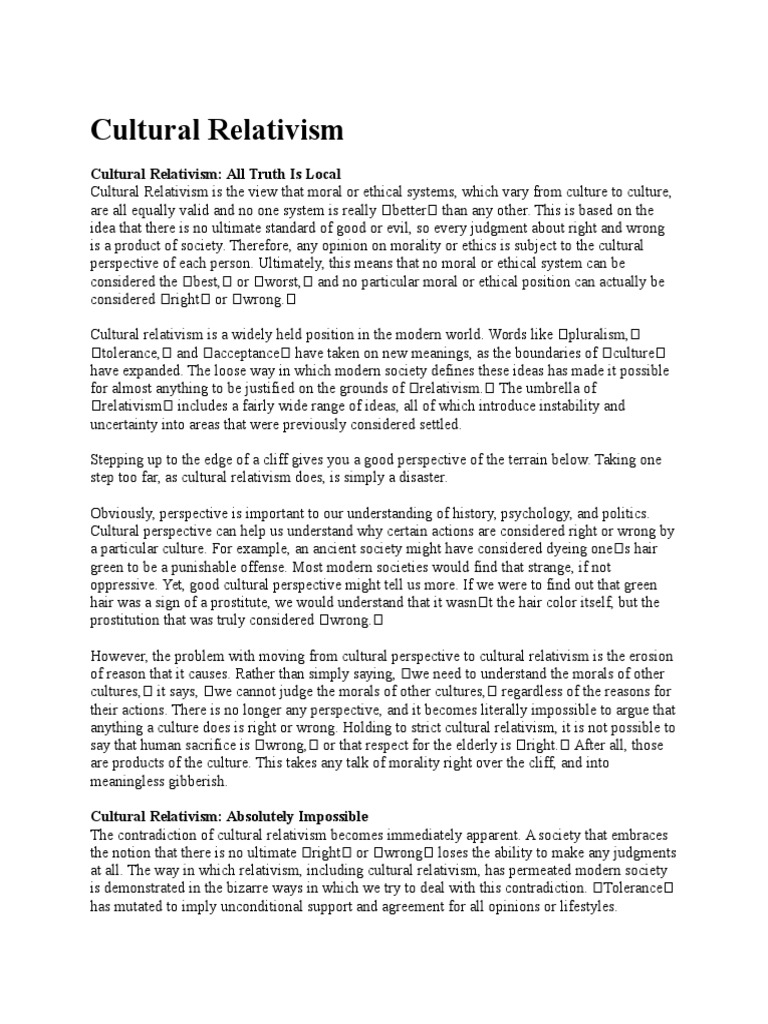In an increasingly interconnected and heterogeneous world, the notion of cultural relativism emerges as a salient point of discussion. This perspective urges individuals to perceive norms, values, and practices through the lens of individual cultures rather than imposing a singular, often Western-centric, framework of morality and ethics. With globalization facilitating intercultural exchanges, the importance of cultural relativism in promoting understanding and tolerance cannot be overstated.
The genesis of cultural relativism can be traced to anthropological discourse, which argues that behavior cannot be comprehended outside the context of cultural frameworks. This tenet serves to challenge the ethnocentric viewpoints engendered by colonialism. Ethnocentrism, the belief in the superiority of one’s own culture, often leads to misinterpretations of cultural practices that may seem foreign or unacceptable. By shifting the paradigm to cultural relativism, it enables the recognition of diversity as a strength rather than a weakness.
At its core, cultural relativism posits that moral principles and ethical standards are not universally applicable but are instead constructed by specific societies. This relativistic approach invites a rich dialogue that can prompt individuals to reconsider the rigidity of their own moral compasses. For example, practices that may be deemed barbaric or unethical in one society—such as polygamy, arranged marriages, or certain dietary regulations—might be integral to the cultural identity and social fabric of another. Thus, cultural relativism fosters an environment where curiosity flourishes, encouraging respectful engagement and understanding.
However, while cultural relativism promotes tolerance, it can also lead to ethical quandaries. The challenge arises when cultural practices are in direct conflict with universal human rights. Consider practices such as female genital mutilation or honor killings, which are defended within cultural contexts. Herein lies the tension: should cultural relativism absolve such practices of scrutiny? It raises pertinent questions about the universal application of human rights and if they should override cultural traditions.
This tension paves the way for a productive dialogue that transcends mere acceptance of cultural diversity. Engaging in discussions about cultural relativism requires a nuanced understanding and a commitment to critical thinking. Through dialogue, individuals can explore the implications of cultural practices while remaining mindful of the complexities involved. The intimacy of conversation invites the re-examination of long-held beliefs, rendering an opportunity for growth and enlightenment.
Dialogue centered on cultural relativism thus emphasizes the importance of active listening and empathy. Approaching conversations with an open mind allows participants to appreciate the intricacies of differing worldviews. One must not only articulate their own perspectives but also earnestly seek to understand the historical, social, and emotional contexts that shape others’ beliefs and practices. This exchange becomes a platform for shared learning and promotes a collective consciousness that values diversity.
Furthermore, as the world grapples with pressing issues such as climate change, cultural relativism encourages responses that are not monolithic but rather tailored to local contexts. Implementing sustainable practices, for instance, necessitates an understanding of cultural beliefs about nature and livelihood. Indigenous communities possess unique insights and stewardship approaches cultivated over millennia, often in harmony with their environments. Ignoring these perspectives can lead to ineffective or harmful environmental strategies.
Thus, engaging different cultures in the dialogue about climate change requires recognition of cultural relativism. Solutions must be co-crafted, respecting local wisdom while integrating scientific knowledge. Successful environmental policies hinge upon this collaboration, fostering sustainability that is cognizant of cultural relevance. As one navigates these dialogues, curiosity serves as a powerful catalyst for discovering innovative practices that honor both tradition and future needs.
The ripple effects of dialogues surrounding cultural relativism can extend beyond immediate interactions, transforming broader societal attitudes. They cultivate a culture of inclusivity wherein diverse voices are acknowledged and valued. This paradigm recognizes that each culture contributes a unique perspective, making the collective richer and more robust. As a society, the embrace of cultural relativism equips individuals to grapple with the inevitable complexity of human interactions, fostering a commitment to equity and understanding.
In conclusion, the promises of increased understanding through cultural relativism compel individuals to transcend simplistic dichotomies of right and wrong. By engaging in meaningful dialogue, there exists an opportunity not only to expand one’s knowledge base but also to refine ethical viewpoints in a manner that appreciates the multifaceted nature of humanity. As we navigate an era marked by globalization and environmental challenges, cultural relativism emerges as an invaluable tool. It invites curiosity, promotes respect, and encourages collaboration. Ultimately, the dialogue surrounding cultural relativism holds transformative potential in advancing societal understanding and fostering a sustainable future for all.
